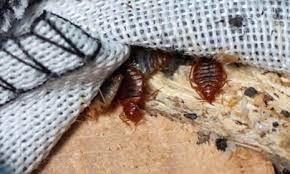Africa-Press – Zimbabwe. THE bed bug nightmare has stretched to several other locations which have been forced to take measures to curb the continued spread the blood-sucking insects.
NewsDay is reliably informed that cities like Mutare, Bulawayo and Gweru are on high alert to prevent the outbreak from spreading.
The bed bugs were first seen in Harare’s sprawling suburb of Mbare, but it has since emerged that infestations have spread to other areas in the capital, such as Glen View, Mabvuku, Budiriro and other suburbs.
The Mutare City Council communication department yesterday said the local authority was conducting routine spraying of potential bed bug breeding areas in and around the city.
“City of Mutare is currently conducting routine spraying of potential bed bug breeding areas in and around the city due to a confirmed outbreak in the country.
“We have also scaled up awareness campaigns to educate our residents on how to protect themselves in the event of an outbreak,” the statement read. All potential areas where Bed bugs can breed are being targeted for fumigation,” council said.
However, it said reports that there were bed bugs at Bako flea market in Sakubva were untrue.
“Please note that there are no confirmed cases of bed bugs in the Bako flea market. The fumigation being carried out is a preventive measure to ensure that our residents are safe from a potential outbreak.
“The City of Mutare is conducting routine spraying of potential Bed bug breeding areas due to a confirmed outbreak elsewhere. We’ve intensified awareness campaigns to educate residents on protective measures,” council said.
Meanwhile, the Community Working Group on Health (CWGH) has warned of possible outbreak of other hazardous diseases in Mbare owing to the bed bug manifestation.
In a statement yesterday, CWGH executive director Itai Rusike said the situation in Mbare was very serious.
“The potential health implications of bed bug infestations are many, ranging from the discomfort of the bites to the disruption of family and social life and the costs associated with getting rid of the infestations.
“These pests are a marker of conditions of overcrowding and poor personal hygiene and once infested, they are very difficult to eradicate, especially given the conditions prevailing at Matererini flats.
“There is a need to not only clean, fumigate, but also to wash all clothes and blankets and knowing Mbare, this may not be tenable due to water scarcity,” he said.
Rusike said there could even be rats and bacterial infections, affecting people, due to uncollected garbage, overcrowding and unregulated vending, among other ills afflicting the area.
“There is need to provide proper urbanisation and housing standards with adequate safe water supply, sanitation to promote good personal and communal environment,” he said.
Rusike said Mbare fell far short of the urbanisation standards enshrined in the country’s Constitution, Public Health Act, the respective urban planning laws and by-laws.
“The latter is clear in the recent utterances by the city council in asserting their ownership of the shameful buildings as they were forcing the residents to vacate the flats for fumigation.
“Fumigation at the stage that the Mbare flats are is neither a public health nor developmental intervention, as that place urgently requires major rehabilitation, decongestion and provision of water and sanitation,” he said.
He said it was not the first time Mbare had been in the spotlight for wrong reasons.
“There was once an ambitious plan by the Local Government ministry (during Chikowore’s tenure) for a phased approach to construct more habitable apartments and only a few materialised.”
“Meanwhile, the buildings, which were meant to house single men who worked in town with wives and families in the rural areas, had been decommissioned many times during the incessant typhoid, cholera and other disease outbreaks and it comes as no surprise to us that there’s bed bug infestation,” he said.
For More News And Analysis About Zimbabwe Follow Africa-Press






